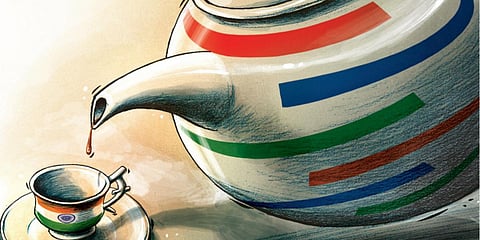

The 12th Ministerial Conference of the World Trade Organization (WTO), or MC12, was convened with the institution facing serious existential problems. Nearly five years ago, the institution was effectively left without a work programme after the 11th Ministerial Conference ended in failure.
In the run-up to MC12, the key question was whether the WTO can respond to its members' concerns, especially when most developing countries were beset with continuing economic uncertainties. Finally, after extended deliberations, WTO members delivered a definitive set of outcomes.
India had significant stakes in MC12. First, it had taken an important initiative to address the problem of vaccine inequity that still looms large. More than 80 per cent of people in low-income countries have not yet received a single dose of the COVID-19 vaccine.
Secondly, India was seeking to protect the livelihoods of its small fishermen even as WTO members were crafting an agreement to rein in harmful fisheries subsidies endangering global fish stocks.
Thirdly, India was looking for a permanent solution for the problem that its public distribution system (PDS) faces in the WTO, with its subsidies bill breaching the maximum threshold prescribed by the Agreement on Agriculture (AoA).
And finally, India had to effectively respond to the questions being asked by WTO members regarding its export restrictions on wheat. Have the outcomes in these areas met India's expectations?
In October 2020, India, along with South Africa, had tabled a proposal seeking a temporary waiver from the implementation, application, and enforcement of four forms of intellectual property rights (IPRs) that impede access to and affordability of vaccines, therapeutics and other products essential for COVID treatment.
The co-sponsors argued that waiving of IPRs would help in increasing the production of these products in the developing world, making them more affordable. This proposal was co-sponsored by 63 other members and supported by almost two-thirds of WTO's membership. However, at the end of MC12, ministers did not endorse the waiver proposal and instead recommended that WTO members issue compulsory licences (CLs) to increase the production of patented vaccines.
Two aspects of this outcome are significant: One, there is no mention of any other form of IPR identified by the proponents of the waiver proposal, and two, therapeutics and other products necessary for Covid-19 treatment stand excluded for the time being.
The agreed way forward was first proposed by the European Union (EU) in July 2021 as a counter to the India-South Africa waiver proposal. Surprisingly, however, the EU proposal was legitimised through an informal process of consultations involving the US, and curiously, the two original proponents of the waiver proposal.
It is unclear why India agreed to back an EU proposal that had nothing additional to offer. At the Doha Ministerial Conference in 2001, WTO members had agreed that CLs can be granted to address public health problems. Moreover, India’s Patents Act includes comprehensive provisions for granting CLs.
The government's acceptance of granting CLs as a way forward to ensure vaccine equity appears strange. Not so long ago, NITI Aayog had questioned the utility of this instrument by saying that "[C]ompulsory Licensing is not a very attractive option since it is not the ‘formula’ that matters …"
Regarding fisheries subsidies, negotiations for which commenced in 2001, MC12 endorsed an agreement to check subsidies that promote illegal, unreported, and unregulated (IUU) fishing and/or fishing an overfished stock.
India has accepted a two-year transition period for removing the egregious subsidies. The agreement allows India to grant such subsidies as long as fishing takes place in its Exclusive Economic Zone (EEZ).
The mention of EEZ in the fisheries subsidies agreement is only a reiteration of the rights that India enjoys under the UN Convention on the Law of the Sea. Further negotiations to introduce "comprehensive disciplines" on fisheries subsidies should take place within four years. How India can protect the interests of small fishermen will be the real point of interest.
India should be disappointed as the permanent solution on public stockholding of food grains was not mentioned in the MC12 outcome document. Not only was it important for India to secure its rights to continue its PDS operations, notwithstanding the subsidy threshold level of 10 per cent of its value of production stipulated by the AoA, it was also necessary to quell the questions being asked in the WTO about whether the source of India’s exports was publicly held food stocks.
Finally, MC12 has recognised that the WTO members can impose export restrictions on food grains to "ensure its domestic food security".
This is no more than old wine in a new bottle as the predecessor institution of the WTO, the General Agreement on Tariffs and Trade, had allowed the imposing of such restrictions since 1948.Given the implications of these outcomes, India would have plenty to ponder about their implications for its economy.
(The writer is Professor, Centre for Economic Studies and Planning, School of Social Sciences, JNU and can be reached at bisjit@gmail.com)